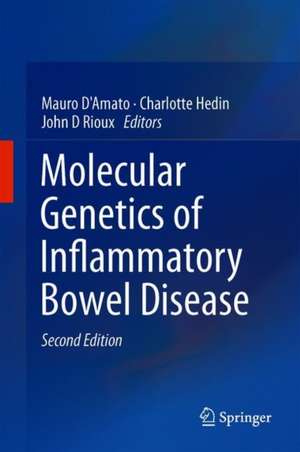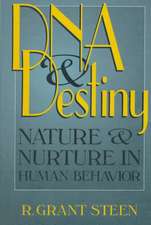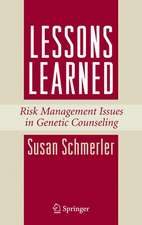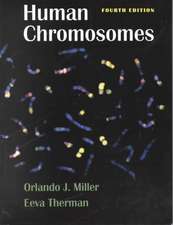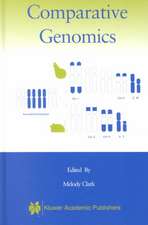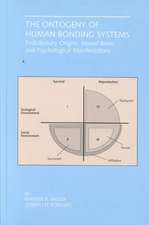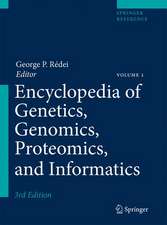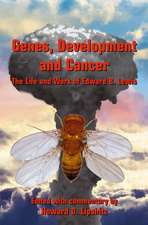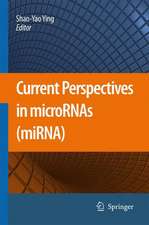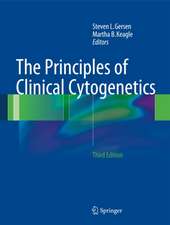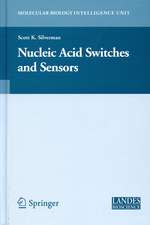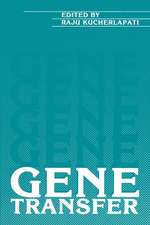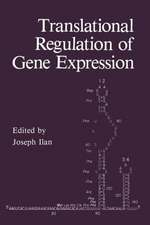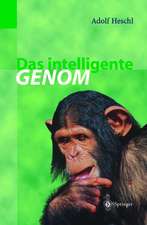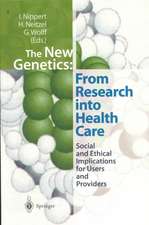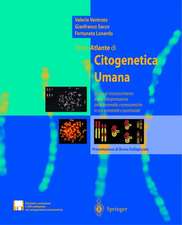Molecular Genetics of Inflammatory Bowel Disease
Editat de Charlotte Hedin, John D. Rioux, Mauro D'Amatoen Limba Engleză Hardback – 19 dec 2019
| Toate formatele și edițiile | Preț | Express |
|---|---|---|
| Paperback (1) | 1605.36 lei 6-8 săpt. | |
| Springer International Publishing – 20 ian 2021 | 1605.36 lei 6-8 săpt. | |
| Hardback (1) | 1612.49 lei 6-8 săpt. | |
| Springer International Publishing – 19 dec 2019 | 1612.49 lei 6-8 săpt. |
Preț: 1612.49 lei
Preț vechi: 1697.36 lei
-5% Nou
Puncte Express: 2419
Preț estimativ în valută:
308.59€ • 335.08$ • 259.21£
308.59€ • 335.08$ • 259.21£
Carte tipărită la comandă
Livrare economică 23 aprilie-07 mai
Preluare comenzi: 021 569.72.76
Specificații
ISBN-13: 9783030287023
ISBN-10: 3030287025
Pagini: 402
Ilustrații: X, 402 p. 37 illus., 35 illus. in color.
Dimensiuni: 155 x 235 mm
Greutate: 0.75 kg
Ediția:2nd ed. 2019
Editura: Springer International Publishing
Colecția Springer
Locul publicării:Cham, Switzerland
ISBN-10: 3030287025
Pagini: 402
Ilustrații: X, 402 p. 37 illus., 35 illus. in color.
Dimensiuni: 155 x 235 mm
Greutate: 0.75 kg
Ediția:2nd ed. 2019
Editura: Springer International Publishing
Colecția Springer
Locul publicării:Cham, Switzerland
Cuprins
Part 1: The Foundation of IBD Genetics, Human and Animal Studies.- A Primer on IBD: Phenotypes, Diagnosis, Treatment and Clinical Challenges.- Genetic Epidemiology of Inflammatory Bowel Disease, Early Twin and Family Studies.- Insights from Recent Advances in Animal Models of Inflammatory Bowel Disease.- Part Two: The Genetic and Molecular Makeup of Inflammatory Bowel Disease.- Complex Disease Genes and their Discovery.- The Genetics of Crohn's Disease.- Genetics of Ulcerative Colitis.- Genetic Overlap between Inflammatory Bowel Disease and Other Diseases.- Molecular Profiling of IBD Subtypes/Response to Therapy.- Epigenetics of Inflammatory Bowel Disease.- Part 3: Pathogenetic Pathways in Inflammatory Bowel Disease.- Nod1 and Nod2 and the Immune Response to Bacteria.- The IL-23-Th17 Axis in Intestinal Inflammation.- Inflammatory Bowel Disease at the Intersection of Autophagy and Immunity: Insights from Human Genetics.- The Epithelial Barrier.- Host Interactions with Bacteria: From “Entente Cordiale” to “Casus Belli”.- Cytokines in Inflammatory Bowel Disease.- Part 4: Concluding Remarks and Future Perspectives.- Towards Personalized Therapy in Inflammatory Bowel Disease.- Index.
Recenzii
Notă biografică
Charlotte Hedin, MD PhD
Dr Charlotte Hedin is a specialist in luminal gastroenterology at the Karolinska University Hospital in Stockholm. She completed her PhD on Crohn’s disease pathogenesis at King’s College London and Queen Mary University of London. In 2017 she was awarded a UEG Rising Star award for her research in IBD, and in 2018 the Karolina prize for “Exemplary patient flow and quality work” at the Karolinska Hospital. She holds a clinical post-doctorate from the Karolinska Hospital. She is a member of the Swedish Organisation for the study of IBD (SOIBD)) and is committee member for the European Crohn’s and Colitis Organisation (ECCO). In addition she collaborates in international IBD research projects, (including the GEM project). Dr Hedin’s research focusses on delineating pathogenic pathways in IBD through studying at-risk individuals (families of IBD patients) and defining the process of mucosal healing.
John D. Rioux, PhD
Dr John D. Rioux is a Full Professor of Medicine at Université de Montréal (UdeM) and Senior Researcher at the Montreal Heart Institute (MHI) and holder of the Canada Research Chair in Genetics and Genomic Medicine. He is a founding member of multiple international consortia and currently co-leads the International IBD Genetics Consortium, is Chair of the Steering Committee of the NIDDK IBD Genetics Consortium and is the leader of the IBD Genomic Medicine (iGenoMed) Consortium. Dr. Rioux’s research focuses on three main areas: (1) genetic studies to identify risk factors for common and rare diseases; (2) functional studies to understand how these genetic risk factors protect or predispose to disease; and (3) integrative human studies to identify predictive biomarkers of important clinical outcomes. Dr. Rioux’s work has led to over 200 publications, cited over 30,000 times. Mauro D’Amato, PhD
Dr Mauro D’Amato is Professor of Genetics and Genomics and Head of the Gastrointestinal Genetics Unit at the School of Biological Sciences, Faculty of Science, Monash University in Melbourne, Australia. He conceived and coordinates the largest gene-mapping effort in irritable bowel syndrome, the bellygenes initiative exploiting data from >800,000 individuals, has served in the Management Committee of several consortia including the International IBD Genetics Consortium, and is member of the European Microscopic Colitis Group. His team combine genomic, computational and pre-clinical expertise to elucidate the pathogenetic mechanisms predisposing to inflammatory and functional gastrointestinal diseases. The druggable genome, nutrigenetics and host (genome) - microbiota interactions are also new research lines within the group. D’Amato’s research has resulted in more than 150 publications and over 13,000 citations.
Dr Charlotte Hedin is a specialist in luminal gastroenterology at the Karolinska University Hospital in Stockholm. She completed her PhD on Crohn’s disease pathogenesis at King’s College London and Queen Mary University of London. In 2017 she was awarded a UEG Rising Star award for her research in IBD, and in 2018 the Karolina prize for “Exemplary patient flow and quality work” at the Karolinska Hospital. She holds a clinical post-doctorate from the Karolinska Hospital. She is a member of the Swedish Organisation for the study of IBD (SOIBD)) and is committee member for the European Crohn’s and Colitis Organisation (ECCO). In addition she collaborates in international IBD research projects, (including the GEM project). Dr Hedin’s research focusses on delineating pathogenic pathways in IBD through studying at-risk individuals (families of IBD patients) and defining the process of mucosal healing.
John D. Rioux, PhD
Dr John D. Rioux is a Full Professor of Medicine at Université de Montréal (UdeM) and Senior Researcher at the Montreal Heart Institute (MHI) and holder of the Canada Research Chair in Genetics and Genomic Medicine. He is a founding member of multiple international consortia and currently co-leads the International IBD Genetics Consortium, is Chair of the Steering Committee of the NIDDK IBD Genetics Consortium and is the leader of the IBD Genomic Medicine (iGenoMed) Consortium. Dr. Rioux’s research focuses on three main areas: (1) genetic studies to identify risk factors for common and rare diseases; (2) functional studies to understand how these genetic risk factors protect or predispose to disease; and (3) integrative human studies to identify predictive biomarkers of important clinical outcomes. Dr. Rioux’s work has led to over 200 publications, cited over 30,000 times. Mauro D’Amato, PhD
Dr Mauro D’Amato is Professor of Genetics and Genomics and Head of the Gastrointestinal Genetics Unit at the School of Biological Sciences, Faculty of Science, Monash University in Melbourne, Australia. He conceived and coordinates the largest gene-mapping effort in irritable bowel syndrome, the bellygenes initiative exploiting data from >800,000 individuals, has served in the Management Committee of several consortia including the International IBD Genetics Consortium, and is member of the European Microscopic Colitis Group. His team combine genomic, computational and pre-clinical expertise to elucidate the pathogenetic mechanisms predisposing to inflammatory and functional gastrointestinal diseases. The druggable genome, nutrigenetics and host (genome) - microbiota interactions are also new research lines within the group. D’Amato’s research has resulted in more than 150 publications and over 13,000 citations.
Textul de pe ultima copertă
Inflammatory bowel disease (IBD) affects 1% of people worldwide. This condition is partly inherited, and genetic research has made enormous progress during the last few years, providing important insight into disease pathogenesis. This book provides a concise but complete overview of existing knowledge, with particular focus on the molecular and genetic mechanisms at the basis of IBD.
Invited experts, at the frontline of IBD research, introduce basic concepts in the pathophysiology of IBD and its two major forms Crohn’s disease and ulcerative colitis, provide a historical perspective and highlight latest discoveries of IBD genetic research, describe how this information has helped to unravel novel pathogenetic pathways, and formulate a vision for future investigations and their clinical application in IBD.
State-of-the-art information contained in this book is an exceptional resource for all those in the biomedical field with a specific interest in IBD, including basic scientists, gastroenterologists, GI specialist doctors and research nurses, but also medical and biomedical students.
Invited experts, at the frontline of IBD research, introduce basic concepts in the pathophysiology of IBD and its two major forms Crohn’s disease and ulcerative colitis, provide a historical perspective and highlight latest discoveries of IBD genetic research, describe how this information has helped to unravel novel pathogenetic pathways, and formulate a vision for future investigations and their clinical application in IBD.
State-of-the-art information contained in this book is an exceptional resource for all those in the biomedical field with a specific interest in IBD, including basic scientists, gastroenterologists, GI specialist doctors and research nurses, but also medical and biomedical students.
Caracteristici
Provides a complete review of existing knowledge of molecular genetics in inflammatory bowel diseases
Highlights the latest discoveries from molecular and genome-wide association studies
Gives insight into disease pathogenesis and potential targets for pharmaceutical intervention
Highlights the latest discoveries from molecular and genome-wide association studies
Gives insight into disease pathogenesis and potential targets for pharmaceutical intervention
